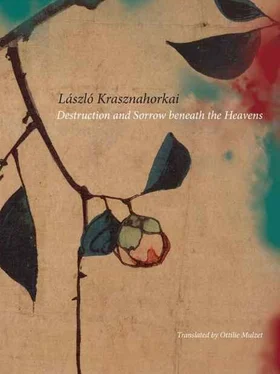yao. You are mistaken. Traditional culture plays a decisive role in the life of China today — despite capitalistic tendencies.
They remain silent for a few moments, Stein thinks, Yao eats. What should he do? Continue? Stop? Stein decides that he will not stop, and so he asks if in the conditions of today the intelligentsia has any opportunities to take part in any decisions? Do the intelligentsia have any kind of importance in terms of influencing what happens in China? Because he knows — he tries to draw the other’s attention to what is unconditionally shared between them — in the world’s other, so-called developed societies, the situation is tragic: the layer of society known as the independent intelligentsia has collapsed, it has no influence on anything at all, what it has to say is not important, it writes about the state of the world, but no decisions are made with its influence or input, things are decided on a level with which the independent intelligentsia — in the former sense of the term — has no connection whatsoever. The overwhelming majority of them have chosen a non-critical role in terms of the structures of power in order to have some access to real decision-making. And when that idea occurs to him, it’s as if he could engage Yao in the conversation again: erudition itself has disappeared, Stein says, and with that the concept of erudition itself. And — if even for a brief moment — some kind of interest finally glimmers in Yao’s eyes.
yao. This is a specific question. The opinions of the intelligentsia, its judgements, its influence, do not affect the processes of society directly. The intelligentsia can affect reality through the transmission of culture and education. In imperial China, for example, the intelligentsia were themselves the emperor’s instructors. They were able to influence rulers by founding schools and through the instruction that took place there, even if they did not have a direct political role. There are no examples similar to this anywhere in the world, this only existed in China, and since then there has never been any kind of similar institutional mechanism. .
Stein concurs approvingly, saying that, yes, this past was truly wondrous. This is why, he says, the entire world respects to such an extraordinary degree the former societal order of Confucianism[66] or, more precisely, the role Confucius himself intended for moral precepts. The image of such a system, which could even be said to be ideal, can be seen in China’s millennia-old past where erudition in its essence meant a life lived according to moral precepts which had the highest possible value and which were built into the structure of society: society was a structure built upon the belief in morality. Stein doesn’t continue on this point, for surely — he indicates with a movement of his hand — Yao is aware of this much more precisely and profoundly; so Stein only poses one question: What has remained of this? Nothing, Mr Yao. Do you agree?
yao. No. Absolutely not. The role of the intelligentsia is just as important today. You have conveyed to me what happened to the intelligentsia in the developed Anglo-Saxon countries. This, however, will not happen in China.
It is clear from Stein’s disappointed countenance that he was not counting on this reply. And he expresses his disappointment or, rather, his incomprehension, wondering if Yao can really think that the constellation into which China entered with the authorization of market relations is not everywhere the same? Does Yao really think that the effect of the legitimization of investment, currency markets and the laws of global finance could somehow lose its potency in China, and only in China, and somehow function differently?
yao. China is not the same. China is different. China cannot be compared to any other country. Legalities are different here, specific. For example, the tradition of the social relevance of the intelligentsia, their extraordinary significance, the vitally important and well-known role of the literati, is very strong.
It is clear that Yao wants to expound upon this unconditionally, so Stein merely interrupts in a helpful manner, indicating that he shares Yao’s opinion, and he asks how this prestigious societal role can be explained.
yao. Chinese writing — with its outstanding role — cannot be compared to anything else. Ever since writing has existed, Chinese writing and the lettered have possessed decisive relevance in the history of the Chinese spirit and society. Never in the world has writing or a system of writing had such crucial significance. It is only thanks to the innate respect for writing inherent in Confucianism that caused China to be governed according to Confucian principles and to be built upon Confucian tradition — a tradition that remains until today. Chinese writing was sacred, irrevocable, absolute respect towards it was mandatory, thus the tradition of classical culture, preserved in writing was exemplary and indisputable. I do not claim that there are not and were not damaging influences stemming from Confucianism — it made society too rigid, everyone recognizes this. But its stance of respect for writing, and through it the creation, unique in the world, of a culture extant in writing is important — it has always been and is still highly worthy of recognition. .
Stein interjects that he, along with many others, does not see in Confucianism or, more correctly, in the teachings of Confucius, an instrument by which society is made overly rigid but, rather, a theory of society which can assure continuity to that society. It did not make it rigid but offered it continuity. Or perhaps it did not even offer this continuity but simply articulated and codified the idea that society was something continuous. And he asks Yao if in his opinion any kind of renascence of Confucian thought could be possible?
yao. The state of change today is immeasurable. But I feel that these changes are external. Tradition is at work in the depths. And one of the most decisive elements of this is Confucianism. I do not believe, however, that it could be revived in an unaltered form. It is indisputable, though, that it will have a crucial role in the future. Society today is restless. If tranquillity returns, then China will return to its own traditions as well. In my opinion, the opposite will occur here in China in relation to what happened in Eastern Europe, in the former Communist societies. In Hungary, the intelligentsia played only a trifling role, there is no way to compare that with the role of the Chinese intelligentsia. In China, this role can never diminish. Because it was always very strong.
Stein has serious doubts about such an argument but, in order to not disrupt what has begun, he asks if the intelligentsia of today has not distanced itself too much from the so-called wider stratum of society.
yao. Traditionally, this relationship wasn’t too wonderful — that is, it was always bad. The intelligentsia always thought that the fate of the world, that is, China, was in their hands. This was one of the most negative traits of the Chinese literati. They didn’t bother with any kind of real connection with a broader spectrum of the public, they believed themselves to be unique and so they looked down upon the lower classes. This will have to be changed in a democratic renascence.
This last sentence, and its obvious empty demagogy or, rather, its immeasurable deception, once again defeats Stein, so he quickly tries to move on to another topic, or to approach the same topic from a different angle, because Stein can’t give up, he can’t stop, he is plunging down the hill now, and so he just asks and asks: he asks, for example, what kind of hope could there possibly be for a young person who would like to become acquainted with his own classical culture. Because from where, from what kind of sources could this be acquired? For classical culture is not a real, living element of everyday life or festivals — instead, there is the culture of modern China. So where can a young person find out anything at all about his own original culture? Is the situation not impossible? All the artworks are fake — instead of restoring ancient monuments, a kind of fraudulent trade is going on, so that whoever wants to understand classical Chinese culture by contemplating its material objects has no chance. As for the knowledge of classical writing and classical erudition — it seems very apparent that it is not the centre of interest for the younger generations. They are interested in completely other things, no?
Читать дальше












